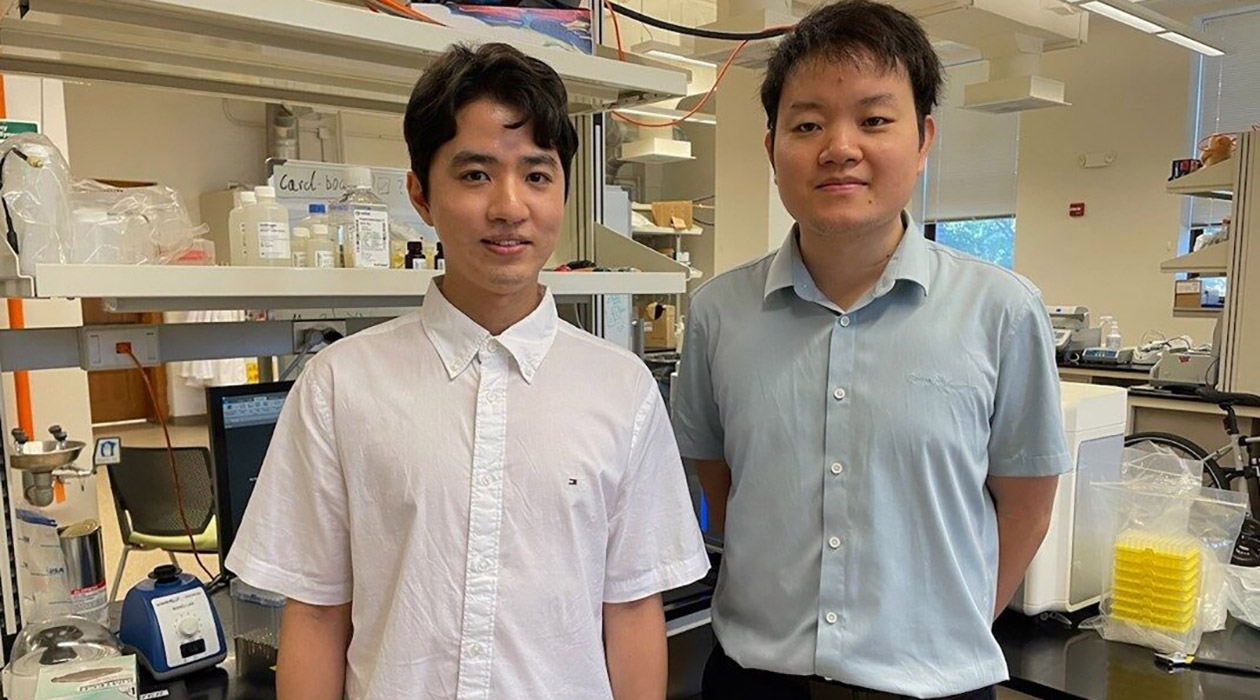Metabolic Glycan Labeling Approach Shows Promise for Improving Dendritic Cell Vaccines

Researchers Joonsu Han (left) and Hua Wang / Cancer Center at Illinois
Hua Wang (RBTE), a professor of Materials Science and Engineering, and his research group are passionate about developing novel – but simple – solutions to not only improve the efficacy of cancer immunotherapies, but also to look ahead to clinical translation. In their recent publication in Nature Communications, they outline their exciting findings that the metabolic glycan (sugar) labeling of dendritic cells (DC) results in enhanced DC activation and antitumor efficacy.
DCs are essential immune cells which can process and present antigens on the cell surface to initiate and regulate immune responses. Dendritic cell vaccines are a form of cancer immunotherapy that isolates monocytes from a patient’s blood, transforming them into tumor antigen-presenting and properly activated DCs, and then administering these mature DCs to the patient to guide the anticancer immune activity.
Wang and his group previously reported on the metabolic glycan labeling of DCs for cancer targeted immunotherapies, but sought to further investigate the effects of metabolic labeling on the DC properties. They found that the metabolic incorporation of the ‘chemical tags’ enhanced the anticancer immune response. Joonsu Han, a PhD student in Wang’s lab and the first author in the team’s paper, explained, “The dendritic cell vaccine was actually one of the first FDA approved cancer immunotherapies, but the antitumor efficacy is still not great. We found that the metabolically labeled dendritic cells actually improve the activation status of DCs,leading to the enhanced cytotoxic T-cell response of DC vaccines.”
Wang and Han propose the enhanced efficacy results from a decrease in the mobility of the dendritic cell membrane. This stiffer membrane may play a role in the initiation of downstream signaling pathways which eventually lead to improved DC activation.
“In addition to the activation of DCs, the chemical tags introduced by the metabolic glycan labeling approach also allows for targeted conjugation of immunomodulatory agents to the adoptively transferred DCs in the body, further improving the CD8+ T cell response and antitumor efficacy,” said Prof. Wang.
Metabolic labeling of DCs could be a powerful tool to improve cancer immunotherapies because the approach is relatively simple and can be applied universally to different DC vaccines.
“I am really excited about this project, and that excitement is really intensified by collaborators at Carle Hospital because our method is simple enough and based on an already clinically approved immunotherapy,” said Prof. Wang. “If we have a good way – a simple way – to improve it, then the therapeutic has a higher chance for clinical translation compared to other new immunotherapies where you would need to go back and start over.”
Han further emphasized the significance of developing methods that can be more easily translated to the clinic, and why he chooses to approach cancer research with a patient first mindset. “My father passed away quite early when I was in high school, so I understand the pain of losing loved ones. While he didn’t die from cancer, he was suffering from disease, and that’s why I drove myself to study health and biotechnology.” Han continued, “I hope this simple technology can eventually have some impact on patients’ lives and lead to good outcomes like being able to go home without cancer.”
Hua Wang is Cancer Center at Illinois (CCIL) member, and is affiliated with the Departments of Bioengineering, the Beckman Institute, Materials Research Laboratory, and Carle College of Medicine.
